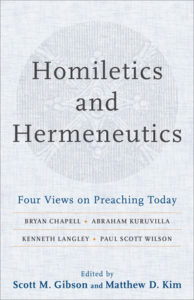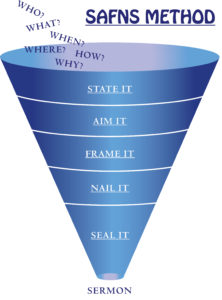PreacherTalk
Blog Posts
HOMILETICS AND HERMENEUTICS: A REVIEW

One of the most recent books – if not the most recent – to be published for preachers is Homiletics and Hermeneutics: Four Views on Preaching Today. Edited by Scott Gibson and Matthew Kim, the book became available in December 2018. What are the theological and hermeneutical underpinnings of our preaching? Do we preach Christ-centered or gospel-centered sermons? How does the flood narrative in Genesis 6 relate to the New Testament? This book will spark discussions about those questions and many others as preachers think through the different evangelical preaching traditions.
The book follows a simple format. Each practitioner presents his position followed by responses from the other three writers. Each writer interacts with four topics in advocating his position: 1) A biblical rationale, 2) A theological rationale, 3) A homiletical rationale and 4) An applicational rationale. There is a refreshing irenic spirit throughout the book as each writer debates the merits of each position with a heart of respect for each other.
Read more...
CHRISTMAS THROUGH HEAVEN’S EYES
 Earthly events are the result of heavenly actions. There are cause and effect relationships between heaven and earth. We can see Christmas through heaven’s eyes portrayed for us in Revelation 12:1-5. In this story, there is a woman, a dragon and a baby. The woman is Israel. The baby is Messiah – Jesus – who will rule the nations with a rod of iron. The great, red dragon represents Satan (cf. 12:9). Satan wages war against Israel over the birth of the Messiah.
Earthly events are the result of heavenly actions. There are cause and effect relationships between heaven and earth. We can see Christmas through heaven’s eyes portrayed for us in Revelation 12:1-5. In this story, there is a woman, a dragon and a baby. The woman is Israel. The baby is Messiah – Jesus – who will rule the nations with a rod of iron. The great, red dragon represents Satan (cf. 12:9). Satan wages war against Israel over the birth of the Messiah.Satan is the enemy of God and God’s people. He is determined to rule this world and will do whatever he can to maintain his rule. Milton wrote of Lucifer in Paradise Lost, “To reign is worth ambition, though in hell. Better to reign in hell than to serve in heaven.” Power is what drives Satan. That same ambition is what drives all those who serve Satan in this world. We see Satan’s global strategy pictured in these verses. He works through humans who will swear allegiance to him. In return, Satan offers such pawns the illusions of earthly success, wealth and power.
Read more...
A PENTATHLON STRATEGY FOR PREACHERS
 A modern Olympic pentathlon combines five sports into one. An athlete completes all five sports in a single day. The first three sports are fencing, freestyle swimming, and equestrian show jumping. The final two sports combine pistol shooting and running into one event. An athlete must balance her efforts to achieve the highest total score which means that sometimes she must avoid pushing to win in one event to focus on a later event. The total score of all five events is all that matters to win Olympic gold.
A modern Olympic pentathlon combines five sports into one. An athlete completes all five sports in a single day. The first three sports are fencing, freestyle swimming, and equestrian show jumping. The final two sports combine pistol shooting and running into one event. An athlete must balance her efforts to achieve the highest total score which means that sometimes she must avoid pushing to win in one event to focus on a later event. The total score of all five events is all that matters to win Olympic gold.
Read more...
SERMON WAYPOINTS
 I just returned from a ten-day boat trip down the eastern coast from Falmouth, Maine to Norfolk, Virginia in Mark Halfacre’s boat Pegasus. Mark was beginning his trip down the intra-coastal waterway to Florida, and I had the privilege of joining him on the first leg. Each night Mark would get out his navigational charts on the iPad and plot his course for the next day. He had to chart a course that avoided shoals under water and buoys above yet led us to the next marina.
I just returned from a ten-day boat trip down the eastern coast from Falmouth, Maine to Norfolk, Virginia in Mark Halfacre’s boat Pegasus. Mark was beginning his trip down the intra-coastal waterway to Florida, and I had the privilege of joining him on the first leg. Each night Mark would get out his navigational charts on the iPad and plot his course for the next day. He had to chart a course that avoided shoals under water and buoys above yet led us to the next marina.Mark would enter the GPS markers on his chart plotter as “waypoints.” Each day we would navigate the boat from waypoint to waypoint. The chart plotter would alert us when we arrived at a waypoint. We would check it off and start for the next waypoint until we arrived at our destination for the night.
Sermon waypoints help us navigate our way from text to message each week. I know that I need spiritual GPS markers to plot the course for my sermon preparation. The waypoints help me avoid the shoals, so my message does not end up as a Sunday shipwreck.
Read more...
THE SAFNS FUNNEL PREACHING METHOD
 Preaching is disciple-making. Our purpose in preaching is to grow fully developed followers of Jesus Christ. We must not neglect the often forgotten word in the Great Commission given to us by Jesus when he called us to teach the people “to observe ALL that I commanded you” (Mt. 28:20). As Paul told the Ephesian elders, “I did not shrink from declaring to you the whole purpose of God” (Acts 20:27). Expository preaching is the best way to achieve the purpose of disciple-making in corporate worship.
Preaching is disciple-making. Our purpose in preaching is to grow fully developed followers of Jesus Christ. We must not neglect the often forgotten word in the Great Commission given to us by Jesus when he called us to teach the people “to observe ALL that I commanded you” (Mt. 28:20). As Paul told the Ephesian elders, “I did not shrink from declaring to you the whole purpose of God” (Acts 20:27). Expository preaching is the best way to achieve the purpose of disciple-making in corporate worship.Every preacher follows a method. The SAFNS funnel is mine. It is not unique to me. Nothing we teach or write about is unique. We stand on the shoulders of others in our ministries. I have taught it at the Bible college level, in the seminary classroom and workshops both here and abroad. I have practiced and honed this method beginning with my first sermon 45 years ago. Here, in summary, is the SAFNS method.
Read more...


